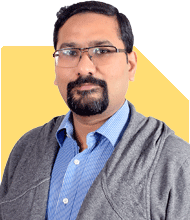Aashish Sood |127 Answers |Ask -Follow
CAT, Management Expert - Answered on Nov 24, 2023
He also mentors management student hopefuls for the group discussion and personal interview rounds that follow competitive examinations.
He has appeared for CAT seven times since 2016 and scored in the 99.9 percentile.
Sood has 16 years of work experience as a management consultant, strategy consultant and research associate.... more

My son is a B Tech (2015 from APJA Univ. UPTECH) and MBA in Marketing (2021 from DTU). Since 2016 he has been engaged with TCS (3 years in IT & 2 year in Marketing after completion of MBA ). He is now looking for a better carrier growth in Marketing. Due to less career growth with present employer and after completion of his MBA, he looks forward for a better opportunity. In market he is not able to get better opportunity. He has been trying various organization but not able to get any result. Can you suggest how he can get a better option with regard to career and financially. I think this the right time to have a change for better career growth. Presently he is 30 years old.
1. I would your son to evaluate his skills, strengths, and weaknesses. Consider the long-term career goals and the industries or roles that align with them.
2. Attend industry events, conferences, and seminars to expand his professional network.
3. Update his Resume and LinkedIn Profile. Ensure that the resume reflects his
4. Consider online courses, certifications, or workshops to stay current in his field.
5. Attend workshops, webinars, or training programs to enhance professional development.
6. He can consider Recruitment Agencies or partner with recruitment agencies or headhunters that specialize in his industry.
Job searches can take time. Stay positive, be persistent, and don't get discouraged by rejections. Consider temporary or freelance opportunities to gain experience while continuing the job search.
You may like to see similar questions and answers below
Patrick Dsouza |1428 Answers |Ask -Follow
CAT, XAT, CMAT, CET Expert - Answered on Apr 15, 2024
Patrick Dsouza |1428 Answers |Ask -Follow
CAT, XAT, CMAT, CET Expert - Answered on Apr 27, 2024
Prof Suvasish Mukhopadhyay | Answer |Ask -Follow
Career Counsellor - Answered on Nov 05, 2024
Dr Dipankar Dutta |1836 Answers |Ask -Follow
Tech Careers and Skill Development Expert - Answered on Dec 05, 2025
Ulhas Joshi |280 Answers |Ask -Follow
Mutual Fund Expert - Answered on Dec 05, 2025
Dr Dipankar Dutta |1836 Answers |Ask -Follow
Tech Careers and Skill Development Expert - Answered on Dec 04, 2025
Ravi Mittal |676 Answers |Ask -Follow
Dating, Relationships Expert - Answered on Dec 04, 2025
Anu Krishna |1745 Answers |Ask -Follow
Relationships Expert, Mind Coach - Answered on Dec 04, 2025
Anu Krishna |1745 Answers |Ask -Follow
Relationships Expert, Mind Coach - Answered on Dec 04, 2025
Mayank Chandel |2562 Answers |Ask -Follow
IIT-JEE, NEET-UG, SAT, CLAT, CA, CS Exam Expert - Answered on Dec 04, 2025
Mayank Chandel |2562 Answers |Ask -Follow
IIT-JEE, NEET-UG, SAT, CLAT, CA, CS Exam Expert - Answered on Dec 04, 2025
Mayank Chandel |2562 Answers |Ask -Follow
IIT-JEE, NEET-UG, SAT, CLAT, CA, CS Exam Expert - Answered on Dec 04, 2025
Mayank Chandel |2562 Answers |Ask -Follow
IIT-JEE, NEET-UG, SAT, CLAT, CA, CS Exam Expert - Answered on Dec 04, 2025



























